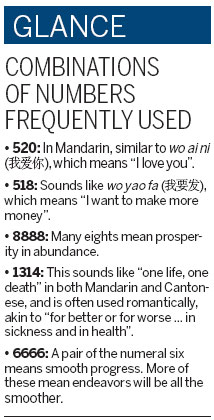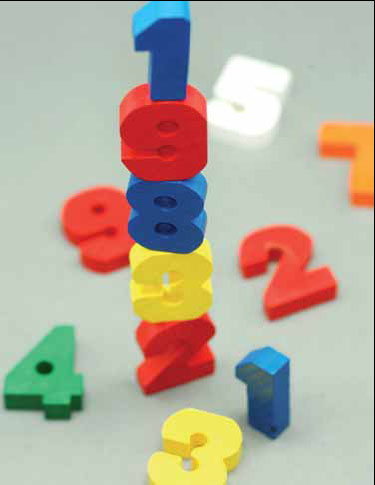Strength in numbers
Updated: 2012-06-22 15:51
By Chen Yingqun (China Daily)
|
|||||||||
|
Chinese numerology views certain figures as being more auspicious than others. Gao Yuwen / for China Daily |

The culturally rich meanings of Chinese numerology are evolving to encompass more
Rosie Baldwin's favorite number is four. She was born in the fourth month of the year, and is also the fourth child of her family. But when Baldwin, a housewife from Ohio in the United States, arrived in Beijing this June, she was surprised that her lucky number was actually the bane of many Chinese people. That is because the number four in Chinese sounds like si, or death.
Just like those of many different cultures, Chinese numerology views certain figures as being more auspicious than others. But its beliefs differ from Western counterparts in many ways. The number 13, for example, does not have the same bad luck connotations as it does in the West.
"The numbers six, eight and nine are commonly believed to be auspicious, because in Chinese they sound similar to words that have positive meanings," says Wang Haohua, deputy secretary-general of the Traditional Chinese Culture Promotion Association.
For many Chinese people, six in Mandarin is pronounced similar to "fluid" (liu) and is therefore considered good for business and smooth progress, while nine, which is pronounced similar to "a long time" (jiu), symbolizes longevity.
Eight, whose pronunciation is similar to the character fa in the Cantonese dialect, can mean prosperity, money and status, and is the luckiest of all.
Moreover, even numbers such as two are luckier than odd numbers because many Chinese people believe that "good things come in pairs". The numbers one, five, and seven that Westerners prefer have more neutral meanings for the Chinese.
The significance of Chinese numbers is now taking on broader and more extensive meanings, even among foreigners, as the country experiences rapid development and its influence continues to grow on the international stage.
"Popular views of Chinese numbers were mostly held by people in Guangdong province (where Cantonese is the local dialect)," says Gao Wei, secretary-general of the Beijing Folklore Society.
"But after the country's reform and opening-up in the late 1970s, the economic strength of this region helped spread its belief all over the country as the local people moved throughout the nation more easily."
It comes as no coincidence that the 2008 Beijing Olympic Games was opened at 8 pm local time on the eighth day of the eighth month.
Numbers of phones and vehicle license plates can also be very expensive because of the auspicious numbers they might have.
According to the Southern Metropolitan Daily, a phone number containing seven of the numeral eight was auctioned at about 464,000 yuan ($72,980, 57,660 euros) in 1994. For the past 11 years, sales of lucky vehicle license plate numbers with auspicious combinations such as 168, which sounds like "be prosperous all the way" (yi lu fa), have reached about 500 million yuan in Dongguan, Guangdong province.
As such, popular phone or vehicle license plate numbers have also become status symbols for their owners. "Sometimes good numbers are indicators of their owners' sound financial situation or high-ranking social status," Wang says.
The opposite is true for unpopular numerals. The Beijing No 4 hospital located in the Chinese capital's Dongcheng district changed its name to the Beijing Puren Hospital in 2000 because many patients were reluctant to go there.
According to a report by the Beijing Evening News, the number of patients at the hospital witnessed a great increase a month after the name change.
"In the past, my mother would rather go a long way to other hospitals instead of going to this one located much closer," says Wang Yunlin, a 42-year-old middle school teacher who lives in the neighborhood. "The last thing patients want to hear is death, but the name would constantly remind them of that."
It is also common for buildings' floors that end with the number four to be excluded - the stories skip the number entirely, such as going from the third story to the fifth. In Seasons Park, an upscale neighborhood in Dongzhimen, Dongchen district in Beijing, there are no "4 or 14 floors".
"Every time there is a number related to four, it will be very difficult for developers to sell their houses," Wang says.
Interestingly, in traditional Chinese numerology, there was no unlucky number - Every number was granted a blissful meaning and people did not relate to the numerals based only on how they sounded, Gao from the Beijing Folklore Society says.
"Ancient people used numbers that were connected to one's birth time to see what would happen to this person in his future," he says.
"They put this person into the natural and social environment, and did not just simply say which number was good and which was bad. "
Ancient divinity treatises such as the He Tu and Luo Shu also relate the numbers to the five elements, with one and six representing water, two and seven representing fire, three and eight representing wood, four and nine representing gold, and five and 10 representing earth.
So if an individual lacked one element in his or her fate, the number representing the missing element would be the lucky numeral to have. For example, people who lacked the element water would probably choose one or six as the lucky number.
Numbers also form interesting roles in various folklores. In northern Hebei province, when a woman first visits the family of her boyfriend, the man's mother will present a hongbao (red packet of money) of 1,001 yuan or 10,001 yuan - which indicates the family's recognition of that woman as "the best one chosen from a thousand or ten thousand others".
Nowadays, many people even use a combination of numbers that indicate a special meaning to mark the important moments of their lives. Yang Fan, a 26-year-old editor from central Henan province, proposed to his girlfriend at 13:14 on May 20, because the combination of the number 5201314 can sound like "wo ai ni yi sheng yi shi", meaning "I'll love you forever".
Singles' Day in 2011, which fell on Nov 11, was considered an auspicious day with the combination being 2011.11.11 - thousands of couples got married, millions celebrated their singlehood and others opened businesses.
Wang says the changing attitudes toward numbers can also reflect how many people approach the uncertainties of modern life. The number nine, which stands for longevity, is not as popular as it was before.
"In the past, they wanted everything good to last forever," he says.
"But now, more people are realizing that 'good for the moment' can be more valuable - and therefore adequately cherished."
chenyingqun@chinadaily.com.cn
(China Daily 06/22/2012 page18)

 Relief reaches isolated village
Relief reaches isolated village
 Rainfall poses new threats to quake-hit region
Rainfall poses new threats to quake-hit region
 Funerals begin for Boston bombing victims
Funerals begin for Boston bombing victims
 Quake takeaway from China's Air Force
Quake takeaway from China's Air Force
 Obama celebrates young inventors at science fair
Obama celebrates young inventors at science fair
 Earth Day marked around the world
Earth Day marked around the world
 Volunteer team helping students find sense of normalcy
Volunteer team helping students find sense of normalcy
 Ethnic groups quick to join rescue efforts
Ethnic groups quick to join rescue efforts
Most Viewed
Editor's Picks

|

|

|

|

|

|
Today's Top News
Chinese fleet drives out Japan's boats from Diaoyu
Health new priority for quake zone
Inspired by Guan, more Chinese pick up golf
Russia criticizes US reports on human rights
China, ROK criticize visits to shrine
Sino-US shared interests emphasized
China 'aims to share its dream with world'
Chinese president appoints 5 new ambassadors
US Weekly

|

|








